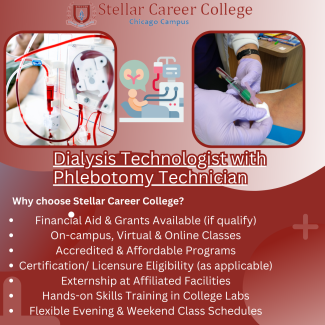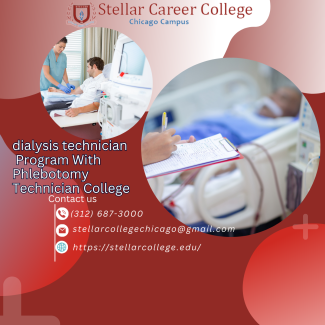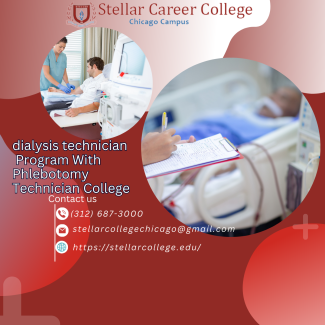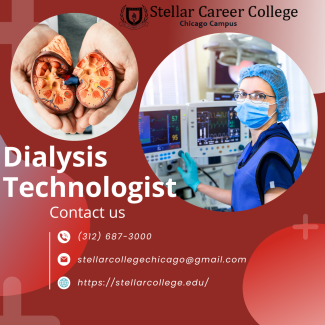The Importance of Dialysis Technologist with Phlebotomy Technician in Healthcare Settings

Meta Description:
Discover the crucial role of Dialysis Technologists with Phlebotomy Technicians in healthcare. Explore their responsibilities, training requirements, and career prospects.
Introduction: The field of healthcare relies on a diverse range of professionals who work together to ensure the well-being of patients. Among these individuals are Dialysis Technologists with Phlebotomy Technicians, who play a vital role in delivering quality care. Combining the skills of dialysis technology and phlebotomy, these specialists are responsible for conducting important procedures and supporting patients undergoing dialysis treatments. This article will delve into the significance of Dialysis Technologists with Phlebotomy Technicians in healthcare settings, providing valuable insights into their roles, training requirements, and career prospects.

- Understanding Dialysis Technologists with Phlebotomy Technicians
- Responsibilities of Dialysis Technologists with Phlebotomy Technicians
- Training and Education Requirements
- Certification and Licensing
- Employment Opportunities
- Salary and Job Outlook
- Advancement Opportunities
- Professional Organizations and Networking
- Challenges and Rewards in the Field
- Conclusion
| Table of Contents |
|---|
| 1. Understanding Dialysis Technologists with Phlebotomy Technicians |
| 2. Responsibilities of Dialysis Technologists with Phlebotomy Technicians |
| 3. Training and Education Requirements |
| 4. Certification and Licensing |
| 5. Employment Opportunities |
| 6. Salary and Job Outlook |
| 7. Advancement Opportunities |
| 8. Professional Organizations and Networking |
| 9. Challenges and Rewards in the Field |
| 10. Conclusion |
Understanding Dialysis Technologists with Phlebotomy Technicians
Dialysis Technologists with Phlebotomy Technicians are healthcare professionals who possess a unique skill set. They are trained in both dialysis technology and phlebotomy, allowing them to perform a range of tasks related to these areas. Dialysis technologists focus on providing care to patients undergoing dialysis treatment, while phlebotomy technicians specialize in drawing blood samples for medical testing and donations. By combining these two disciplines, Dialysis Technologists with Phlebotomy Technicians offer comprehensive support to patients with kidney disease or other renal conditions.
Responsibilities of Dialysis Technologists with Phlebotomy Technicians
The responsibilities of Dialysis Technologists with Phlebotomy Technicians are diverse and multifaceted. Their primary duty is to assist patients throughout the dialysis process, ensuring their comfort and safety. This includes preparing dialysis machines, monitoring patients’ vital signs, and maintaining a sterile environment during procedures. Moreover, these professionals also play a crucial role in drawing blood samples for laboratory analysis, using their phlebotomy expertise to ensure accurate and efficient specimen collection.

Training and Education Requirements
Becoming a Dialysis Technologist with Phlebotomy Technician typically requires completing a formal education program. These programs, available at vocational schools or community colleges, provide comprehensive training in both dialysis technology and phlebotomy. The coursework covers topics such as renal anatomy and physiology, dialysis procedures, infection control, blood collection techniques, and patient care. Practical hands-on training is also an essential component of these programs, allowing students to develop the necessary skills under the guidance of experienced instructors.

Certification and Licensing
Upon completing the education program, Dialysis Technologists with Phlebotomy Technicians may choose to pursue certification to enhance their professional credentials. Certification is offered by various organizations, such as the Board of Nephrology Examiners Nursing and Technology (BONENT) and the American Society for Clinical Pathology (ASCP). Obtaining certification demonstrates a commitment to professionalism and validates the individual’s knowledge and skills in the field.
Employment Opportunities
Dialysis Technologists with Phlebotomy Technicians can find employment in a variety of healthcare settings. They may work in dialysis centers, hospitals, clinics, or blood banks. The demand for these professionals is expected to grow steadily due to the increasing prevalence of kidney disease and the rising need for dialysis treatments. Additionally, opportunities for specialization within the field, such as pediatric or geriatric dialysis, offer further avenues for career development.
Salary and Job Outlook
The salary of Dialysis Technologists with Phlebotomy Technicians can vary depending on factors such as experience, location, and employer. On average, these professionals earn a competitive salary, and the job outlook for this field is promising. With the aging population and the rise in chronic kidney disease cases, the demand for dialysis services is expected to increase, thereby creating a consistent need for skilled Dialysis Technologists with Phlebotomy Technicians.
Advancement Opportunities
As Dialysis Technologists with Phlebotomy Technicians gain experience and further their education, they can pursue advancement opportunities within their field. They may choose to specialize in a particular area of dialysis or phlebotomy, such as pediatric or geriatric care. Alternatively, they may explore leadership roles, such as becoming a supervisor or instructor in a training program. Continuous learning and staying up-to-date with the latest advancements in the field are crucial for professional growth.
Professional Organizations and Networking
Joining professional organizations related to dialysis technology and phlebotomy can be highly beneficial for Dialysis Technologists with Phlebotomy Technicians. These organizations provide networking opportunities, access to resources and research, and the chance to stay informed about industry developments. Examples of such organizations include the National Kidney Foundation, the American Nephrology Nurses Association, and the National Phlebotomy Association.

Challenges and Rewards in the Field
Working as a Dialysis Technologist with Phlebotomy Technician can present both challenges and rewards. The nature of the job involves direct patient care, which requires compassion, empathy, and the ability to handle stressful situations. Dealing with patients who are undergoing dialysis treatments or blood draws can be emotionally demanding. However, the rewarding aspect lies in making a positive impact on patients’ lives, helping them manage their health conditions, and contributing to their overall well-being.
Dialysis Technologists with Phlebotomy Technicians often work closely with a multidisciplinary team of healthcare professionals, including nurses, nephrologists, and other specialists. Effective communication and collaboration are essential in ensuring that patients receive comprehensive and coordinated care. These professionals must maintain clear and concise documentation of patient information, including treatment records, laboratory results, and any complications or adverse reactions observed during dialysis or phlebotomy procedures. Attention to detail and accuracy are paramount to ensure patient safety and facilitate seamless transitions in patient care.
In addition to their technical skills, Dialysis Technologists with Phlebotomy Technicians must possess strong interpersonal skills. They often work with patients who may be experiencing physical discomfort or emotional distress due to their medical condition. Being compassionate, empathetic, and able to provide emotional support can greatly enhance the patient experience and contribute to positive outcomes. These professionals should also have good problem-solving abilities, as they may encounter unforeseen challenges during procedures or while managing dialysis equipment.
Continuous professional development is crucial for Dialysis Technologists with Phlebotomy Technicians to stay abreast of the latest advancements in their field. They should actively seek opportunities for continuing education, attend workshops, conferences, and seminars to expand their knowledge and skills. Keeping up with emerging trends and new technologies ensures that they provide the highest quality of care to their patients.
To maintain patient safety and adhere to regulatory standards, Dialysis Technologists with Phlebotomy Technicians must strictly follow infection control protocols and maintain a sterile environment during procedures. This includes proper hand hygiene, the use of personal protective equipment, and regular equipment maintenance. Adherence to these practices helps prevent the spread of infectious diseases and ensures the well-being of both patients and healthcare providers.
The field of dialysis technology and phlebotomy offers various career paths and opportunities for specialization. Some professionals may choose to specialize in pediatric or geriatric care, focusing on the specific needs of these patient populations. Others may explore opportunities in research or education, contributing to the advancement of knowledge and training the next generation of healthcare professionals. By continuously expanding their skill set and seeking new challenges, Dialysis Technologists with Phlebotomy Technicians can build rewarding and fulfilling careers.
In conclusion, Dialysis Technologists with Phlebotomy Technicians play a crucial role in healthcare settings, particularly in the management of patients with kidney disease or renal conditions. Their combined expertise in dialysis technology and phlebotomy enables them to provide comprehensive support to patients throughout the dialysis process, including conducting procedures and ensuring patient comfort and safety. These professionals undergo specialized training and education to develop the necessary skills and knowledge required for their roles. Certification and licensing further enhance their professional credibility and demonstrate their commitment to excellence.
Employment opportunities for Dialysis Technologists with Phlebotomy Technicians exist in a range of healthcare settings, and the demand for their services is expected to grow. With an aging population and the increasing prevalence of kidney disease, the need for dialysis treatments continues to rise. This, in turn, creates a consistent demand for skilled professionals who can support patients undergoing dialysis and perform phlebotomy procedures.
While the field presents its challenges, such as the emotional demands of working with patients undergoing treatments, the rewards are significant. Making a positive impact on patients’ lives, helping them manage their health conditions, and contributing to their overall well-being are deeply fulfilling aspects of this profession. Dialysis Technologists with Phlebotomy Technicians have the opportunity to develop professionally, pursue specialized areas of practice, and contribute to the advancement of their field through continuous learning and professional development.
Conclusion
Dialysis Technologists with Phlebotomy Technicians play a critical role in the healthcare system, providing essential support to patients with kidney disease or renal conditions. Through their expertise in dialysis technology and phlebotomy, these professionals ensure the safe and efficient delivery of care. The field offers exciting career prospects, with opportunities for growth, competitive salaries, and the satisfaction of making a difference in patients’ lives. As the demand for dialysis services continues to rise, the importance of Dialysis Technologists with Phlebotomy Technicians in healthcare settings cannot be overstated.

